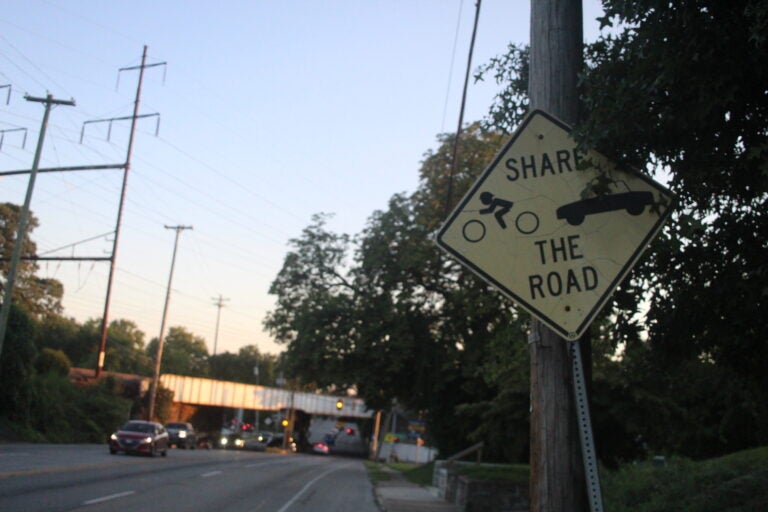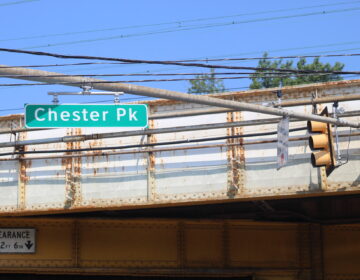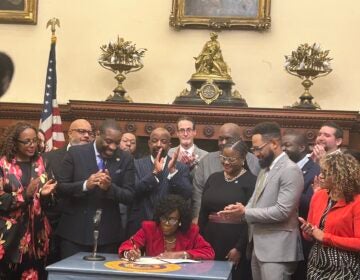Chester Pike facelift: Delco officials propose upgrades for a thoroughfare more friendly to pedestrians and bicyclists
An engineering firm has recommended reduced lanes, more bike paths and shorter crosswalks. Now it’s up to the boroughs to execute the plan.

Chester Pike, an auto-centric thoroughfare, currently lacks dedicated infrastructure for cyclists. (Gabriel Donahue/WHYY)
Have a question about Philly’s neighborhoods or the systems that shape them? PlanPhilly reporters want to hear from you! Ask us a question or send us a story idea you think we should cover.
Chester Pike in Delaware County could soon have narrower car lanes, bike paths and wider sidewalks.
The proposed improvements are part of a recommendation by Conshohocken-based Colliers Engineering to alleviate traffic woes and support more pedestrian- and bike-friendly towns.
About five years ago, community leaders from Sharon Hill, Glenolden, Norwood, Prospect Park and Ridley Park converged to create the Chester Pike Corridor Improvement Partners, a nonprofit dedicated to revitalizing the area. Their vision was crafted into a master plan to make the roadway more environmental and family-friendly.
In 2022, the agency received a $125,000 grant from the Delaware Valley Regional Planning Commission to conduct a road improvement study.
David Schwartz, project manager at Colliers, said the upgrades will cost $800,000 to a few million dollars per intersection. Officials said they will fund the projects through grants and borough contributions.
Tracy Barusevicius, executive director of the Delaware County Transportation Management Association, said each borough will decide on projects they want to prioritize and implement. Officials did not offer a timeline or start date.
One of the priorities is the intersection at Lincoln Avenue in Prospect Park, where one left-turning lane could become two. Officials also said they want to reduce the six-lane stretch in Sharon Hill because it doesn’t attract a high traffic volume.
Residents and commuters have long complained about the stretch of road where Chester Pike meets South Avenue in Glenolden. Schwartz said that section will not be upgraded at this time, because it requires Amtrak’s approval. The transit agency owns the train bridge above the road.
Amtrak told WHYY News in a statement that it “looks forward to continuing to work together as a community partner to provide support where possible.”
Among other recommendations in the Colliers report is a parallel “bike the pike” route, similar to the Bicyclists’ Baltimore Pike. This would offer a safer alternative to biking directly on Chester Pike.
In an emailed statement, PennDOT affirmed its support for the upcoming safety projects.
‘It’s dangerous’
Pedestrians and bikers have long advocated for safety along the pike.
“Each [intersection] has more than one challenge for a pedestrian or a cyclist to get across Chester Pike,” said Lyn Hedrick, an action team member for Bicycle Coalition-affiliate Bike Delco and volunteer at John Heinz National Wildlife Refuge.
Hedrick said she frequently bikes along a safer parallel route to get to John Heinz from her home in Collingdale. She said she avoids Chester Pike because of fast-moving cars and narrow shoulders.
“People shouldn’t have to not have access to a corridor simply because it’s dangerous,” Hedrick said. “Pedestrians and cyclists have reasons to shop or visit or travel along Chester Pike, and they shouldn’t have to have their life at risk to do it.”
According to PennDOT data, 17,000 drivers pass the 6-mile stretch from Ridley Park to Sharon Hill on any given day. An average of 110 crashes occurred annually on that section of Chester Pike from 2017 to 2021, with at least four fatalities.
Embracing the past, moving toward a safer, greener future
Chester Pike was not always the racetrack it has now become.
A trolley line ran along the pike from 1893 to 1934. Track adjustments were made in 1926 when the route was paved with concrete following pressure from the Keystone Automobile Club.
Eventually, trolleys were removed as cars took over the streets — a scene that played out in almost all of Delco, Ed Bombaro, an urban development planner, said.
Bombaro said there is now a growing population of environmentally conscious people who don’t own cars.
Barusevicius said the Transportation Management Association aspires to serve those residents and move commuters along the corridor more efficiently.
“It was all about accommodating the cars and the parking,” she said. “You just can’t do that anymore ‘cause there’s so much else to consider.”
The plans to upgrade the roadways, bike paths and sidewalks come alongside efforts to obtain a Keystone Communities main street designation for Chester Pike and adjacent commercial hubs.

Subscribe to PlanPhilly
WHYY is your source for fact-based, in-depth journalism and information. As a nonprofit organization, we rely on financial support from readers like you. Please give today.






